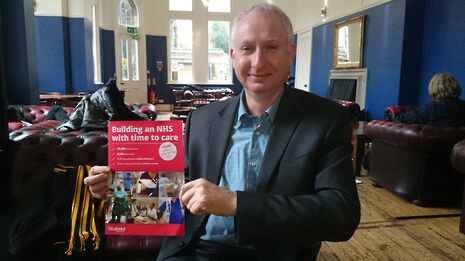Election Profile: Daniel Zeichner
Ahead of the general election, Varsity interviews the main candidates

It seemed the liberal stars had aligned: I met Daniel Zeichner, Labour’s parliamentary candidate for Cambridge, on BBC Democracy Day in the Union bar (“The home of free speech”, a blackboard reminds us, “since 1815”).
Does fortune favour him? “I leave predictions to the pollsters,” he says airily. He’s a relaxed, softly-spoken man of 58, a King’s alumnus and lifelong Cambridge resident.
“There’s a huge change that’s gone on [since 2010]... If Labour doesn’t win this seat, then it’s actually unlikely that Labour can win the government.”
He says that the feeling on the doorstep in 2010 was overwhelmingly “not Conservative”, rather than expressing a preference between the other parties.
“Then what happens? They largely plump for the Liberal Democrats, who promptly do a U-turn and back the Conservatives... Under the current voting system, there’s absolutely no alternative to voting Labour, because if you don’t” —he pauses for dramatic effect—“who knows?”
The mention of the voting system is not an accident. I ask him about constitutional reform and he lights up.
“In the AV referendum, obviously, Cambridge was one of the half-dozen constituencies in the country that supported it... Personally, I’ve been very involved in House of Lords reform over many years.” After much wrangling, “we are now pledged to a democratically elected Senate, as we call it.”
It’s not the sexiest political issue. “[W]hile I accept that it doesn’t necessarily set people’s hearts on fire on the doorstep, actually it’s part of changing Britain, moving into a 21st-century democracy”, he says.
So constitutional reform is what animates him? “No, that’s what animates me today. What animates me is social justice; the constitutional change is a way to get to a more just society.”
It’s about leadership, Zeichner says, and he accuses Julian Huppert of failing to speak for Cambridge. “One of the things [I’ve done] in Cambridge is to work far more collaboratively across party lines with [council] leaders in a way that I’m afraid the current incumbent hasn’t.”
“He basically just has squabbles with them,” Zeichner adds, with a hint of contempt.
He accuses his rival of “cynicism” over tuition fees: Huppert voted against the fee increase in this Parliament and tabled an unsuccessful amendment to abolish them entirely.
This doesn’t wash, says Zeichner. “It made no difference at all, because he was part of a party that was supporting the government. He knew perfectly well they had the majority and that gave him the free pass to defend it here. It’s that kind of cynicism that...turns people off politics.”
What’s his position on this most emotive of issues?
“I’m not an abolitionist in the full sense,” he says. “In the period when I went to university... it was very unfair that working-class people were paying out their taxes for a small part of the population to get a very good education. I’ve actually long supported a graduate tax, as has Ed Miliband.”
Labour’s policy on this still has had no concrete announcement. “We’re getting closer to an election now, and there’s continuing debate within the front bench about exactly what the offer will be, but I’m very confident that it will be downwards.”
Students are not an average electorate, and so I ask Zeichner about another big issue: drugs. “I inhaled, incidentally,” he says casually, ignoring my double-take.
“I would just urge a little bit of caution. The drugs scene in a place like Cambridge is different from the drugs scene in some poorer communities.
“Labour has a responsibility not just to university cities, but to the poorer communities too. In those places we’ve got to be very careful about the message we’re sending out.”
In summary? “Be careful about the changes you make, because it can lead to unintended consequences.”
When Labour were last in government, the Home Secretary Alan Johnson dismissed Professor David Nutt over drugs policy, drawing ire over its attitude to scientific evidence.Zeichner’s take on this is subtle. “It’s foolish not to look at the evidence, but politicians are elected to make judgments, too, and that’s the point.”
People are not always neatly rational, he says. “Dealing with people is endlessly fascinating, but you can’t just reduce it down to ‘evidence’. It’s about empathy, it’s about communication, it’s about understanding.”
This is why, he says, he is driven by social justice, as evidenced in his campaigns on the living wage. “Yes, there’s evidence, and we use it, but I don’t see why a rich university like Cambridge, which raised a billion pounds in a couple of collections, still has almost a thousand people earning below the living wage.”
Zeichner is an intelligent man, with genuine interests in streamlining the constitution and in achieving what he views as social justice. However, he faces a formidable, highly visible incumbent in an election that is increasingly certain to come down to the wire. Much will be decided on the basis of Labour’s manifesto when it is published – and Julian Huppert’s record.
 News / Caius mourns its tree-mendous loss23 December 2025
News / Caius mourns its tree-mendous loss23 December 2025 News / Clare Hall spent over £500k opposing busway 24 December 2025
News / Clare Hall spent over £500k opposing busway 24 December 2025 Comment / Yes, I’m brown – but I have more important things to say22 December 2025
Comment / Yes, I’m brown – but I have more important things to say22 December 2025 Comment / The ‘class’ of Cambridge24 December 2025
Comment / The ‘class’ of Cambridge24 December 2025 Interviews / Politics, your own way: Tilly Middlehurst on speaking out21 December 2025
Interviews / Politics, your own way: Tilly Middlehurst on speaking out21 December 2025







